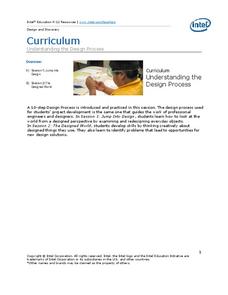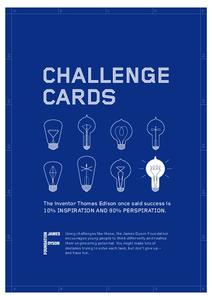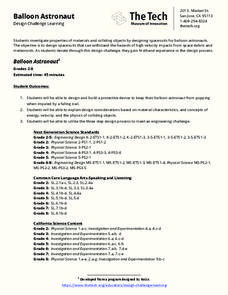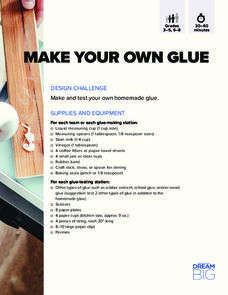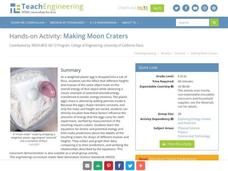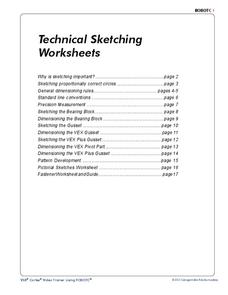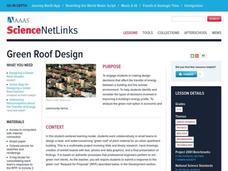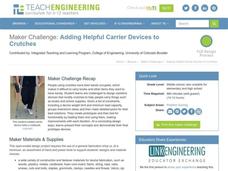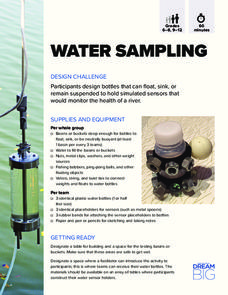NASA
Applying Newton’s Laws
Newton's Laws get the rocket to work, but do they serve any other functions? A six-page resource classifies rockets by the type of propellant they use. It then describes applications of Newton's Laws of Motion, both in the ability to...
Intel
Understanding the Design Process
Can you build a better mousetrap? Broken into two sessions, this plan introduces learners to the design process. The first session has pupils look at the world through a design perspective by redesigning everyday objects. In the second...
James Dyson Foundation
Challenge Cards
Can you build it? Yes you can! This interactive game includes four design challenges presented on separate cards. The cards outline the challenges with limited restrictions but with an end goal in mind. The competitions include building...
Teach Engineering
Force on a Current Carrying Wire
What do electrical currents have to do with an MRI? Using a simple wire setup and a magnet, class members explore forces used in an MRI by investigating the magnetic force acting on a wire carrying a current.
Teach Engineering
Who Can Make the Best Coordinate System?
Working with a map that does not have a coordinate system on it, small, collaborative teams must come up with a coordinate system for their map. Groups then explain their coordinate structure to the class.
Rochester Institue of Technology
Ergonomic Packing
Pupils revisit the concepts of ergonomics and order picking examined in previous lesson plan and use the results of a simulation to brainstorm ergonomic designs for medical supply stations.
Teach Engineering
Graphing Equations on the Cartesian Plane: Slope
Slopes are not just for skiing. Instructors introduce class members to the concept of slope and teach them how to calculate the slope from a graph or from points. The lesson plan also includes the discussion of slopes of parallel and...
Teach Engineering
Density Column Lab - Part 2
Groups suspend objects within layers of liquids to determine the densities of different liquids and compare them to the densities of objects calculated in Part 1. The groups then carefully test their calculations by layering the liquids...
Teach Engineering
DNA Forensics and Color Pigments
Use food coloring in electrophoresis. The last segment in a four-part series mimics DNA fingerprinting by using chromatography. Teams conduct chromatography on food coloring to find colors that use similar pigmentation in their makeup.
Tech Museum of Innovation
Balloon Astronaut
Design protection from high-speed particles. The STEM lesson plan highlights why astronauts need protection from space debris. Pupils use the design process to design, build, and test a spacesuit that will protect a balloon from a...
Tech Museum of Innovation
Energy at Play
Get the ball rolling and challenge your class to figure out how to make a ball move. The instruction segment is between two STEM activities devoted to doing just that. The first is simple and involves making a ball move from some force...
DiscoverE
Marble Run
It's time to slow your roll! Can your class create a track that allows a marble to roll as slowly as possible? Teams of science scholars collaborate to design, build, and test their tubes while learning about gravity and friction.
DiscoverE
Rocket Challenge
You might just be responsible for launching a future career in rocket science. Pupils use Alka-Seltzer® tablets as the power source for a film-canister rocket. These rockets must able to carry a clay payload and hit a target on a wall.
DiscoverE
Make Your Own Glue
You won't regret being stuck with this activity. By mixing a variety of household items, pupils create their own glue. They test the tensile strength of their glue and compare it to that of other adhesives.
Teach Engineering
Making Moon Craters
Create an egg-citing study of energy. Pupils investigate the effect of height and mass on the overall amount of energy of a falling object. The fourth segment in a six-part series on energy uses a weighted egg falling from different...
DiscoverE
Critical Load
Help your class master the important concept of critical load. Pupils work together to build a structure using 12 playing cards. They test the critical load of the structure using pennies or paper clips.
Carnegie Mellon University
Technical Sketching Worksheets
How do you create a technical drawing? Cover the basics of technical sketching with a few practice sketches of simple shapes. A technical sketching lesson introduces the proper precision measurement techniques. Pupils progress to draw...
NASA
Touchdown
Individuals design and build a set of shock absorbers to protect their astronauts when they land. Using a limited amount of supplies, pupils build a system that will keep two large marshmallows from flying out of a cup when it lands...
Rochester Institue of Technology
Meal Picking
Scholars explore systems design and its relation to meal picking by using computer simulations to test systems designs. They learn about the Pick-to-Light System and calculate average picking times.
Rochester Institute of Technology
Skateboard Performance Testing
Perform an activity on performance testing with a lesson focused on the purpose of wheel bearings on skateboards. Learners conduct performance testing on a skateboard to collect and interpret data.
Science NetLinks
Green Roof Design
Green roofs aren't just eco-friendly — they are literally green with trees. Groups learn about the concept of green roofs in order to be able to design one. The groups design a 5,000-square-foot green roof for a fictional apartment row...
Teach Engineering
Maker Challenge: Adding Helpful Carrier Devices to Crutches
Make breaking a leg a less troublesome experience. Groups brainstorm designs for crutches that have devices that help carry items. They build prototypes of their devices to test out their designs.
Science Matters
Earthquake Building/Shaking Contest
Japan is one of only a handful of countries that constructs buildings that are almost earthquake proof. The 13th lesson in the 20-part series challenges scholars to build structures to test against earthquakes. With limited materials and...
DiscoverE
Water Sampling
What is the best way to test water quality? Using plastic bottles, scholars create monitoring sensors to test water quality. Creating three different sensors allows individuals to measure water quality at different water levels.



